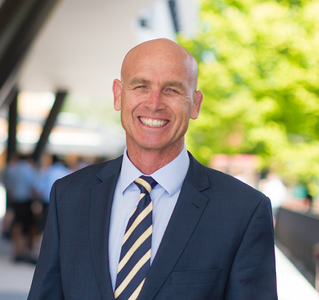A New Era
A New Era
Forming respectful and caring relationships lies at the heart of Marist spirituality, creating communities as places where we relate to each other with consideration and kindness. As Marist educators, we strive to offer a spirituality that is invitational and accessible, grounded in nurturing relationships to form young men who will be compassionate and gracious, intellectual and aware, faith-filled and hopeful.
The House System provides the foundation and support to achieve these characteristics of a Marist education. It has grown and evolved over the history of the College and has become a defining characteristic of our community.
In 1968, the College established four ‘Colour’ Houses, primarily to build competition such as carnivals. In 1986, the House System evolved with the introduction of six Houses to focus on the growth and care of the individual. An additional two new Houses were added in 1988. The next significant milestone saw the introduction of the vertical House Group in 2008 to further foster relationships and connection across year groups while providing authentic role models for younger boys.
With the increase in the College population, it is time for the next evolution for our House system with the introduction of Ludovic House and Le Rosey House. As part of this change, we will align the House System across Years 4 - 12. Each Junior School boy will now identify with a House from the time of their enrolment. While Junior School boys will not meet with Senior School students each day, there will be many and varied opportunities to build caring and trusting relationships with boys in the Senior School.
This is a new era, an exciting opportunity to grow and continue to foster a tight-knit community of young men who encourage, console, share and laugh together while upholding cherished House traditions.
Therapy of Listening
Over a recent family meal, a discussion surfaced around the opposing positions for the Indigenous Voice to Parliament referendum. People of goodwill exist on all sides of the national conversation and Marist College is certainly not proposing how anyone should vote in the referendum. That is not our role; rather it is to encourage critical thinking, dialogue, and listening in order to obtain mutual understanding.
Schools in the Marist tradition have always encouraged critical thinking, deep thinking and reflection. Reflection is the space you create to allow connections to be made and meaning to surface. As a community we also take to heart Pope Francis’ counter culture practice he calls the ‘therapy of listening’. Francis says this involves much more than hearing but having the ‘desire to understand, to give value, to respect and to treasure the words of others.’
We too often, unfortunately, approach an argument as a fight between two opposing sides. This argument culture encourages us to approach the world in an adversarial frame of mind: there must be a winner and loser. The tactic of ignoring what the other person has to say, often attacking someone or presenting extreme ideas does not solve any residing problems. If we fail to understand what the other person is saying, we are just trying to win even if there are some points from the opposing view that may make sense.
Such an approach gets in the way of attaining understanding, it polarizes issues and makes human relationships more adversarial as we demonise those we disagree with. Sadly, some aspects of the current Indigenous Voice to Parliament discussions echo these concerns. There has been misinformation, there has been smear and there has been menace.
It seems to me that for us today, Pope Francis' ‘therapy of listening’ more than ever has its place, especially in a school. People only express themselves fully when they are not merely tolerated, but know they are truly accepted. Whilst the cut and thrust of debate is important for society, this can still be achieved by respect for the other, a search for agreement, perhaps compromise, maybe a private correction where appropriate and possible. In doing so, we will learn to look at the world with different eyes and come to appreciate the richness of human experience. Most of our boys are not yet of age to be offered a ballot paper. We, nonetheless, encourage families to engage their sons on the issues of the referendum. Firstly, they will gain a deeper grasp of the issues. More importantly, they have experienced what Pope Francis called ‘therapy of listening’; the graced way of reason and respect, of listening and learning. This is the way of building bridges rather than trenches, the way of understanding, not undermining. All drawing us to the common good.
Matthew Hutchison
Headmaster
































